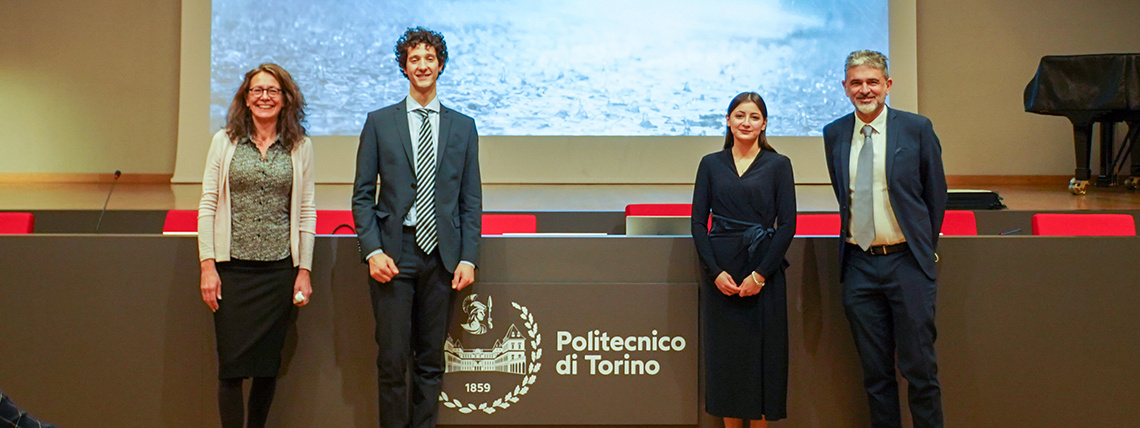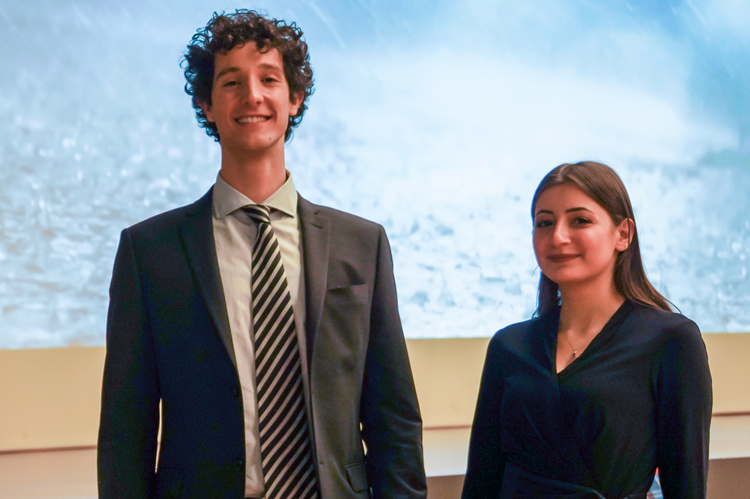The articles of the current edition are available on the new site.

The first graduates in the "Climate Change" track of the Master's Degree programme in Environmental and Land Engineering defended their thesis today. Vittorio Giordano, worked on future crop water footprint scenarios across the African continent, under the supervision of Dr. Marta Tuninetti and Professor Francesco Laio, who is the Head of the Department of Environmental, Land and Infrastructure Engineering (DIATI). In the same graduation session, Yara Hammoud, a student coming from the Lebanese American University, defended her thesis on modeling the role played by the cryosphere in dictating the ground temperature of an Alpine permafrost area. Her supervisors were professor Jost von Hardenberg and two external experts from ARPA Piemonte, Dr Christian Ronchi and Dr Luca Paro.
The Master’s Degree in Environmental and Land Engineering of Politecnico di Torino trains future engineers capable of finding engineering solutions that allows for a sustainable coexistence of human activities and a healthy natural environment. Since the academic year 2019/2020, alongside the existing tracks in Environmental Protection, Natural Hazards and Civil protection and Geo-Engineering, a new track on “Climate Change” has been launched. This is fully taught in English and it is the first engineering track in Europe specifically dedicated to climate change. Its aim is to train a new generation of engineers capable of facing the complex environmental and societal challenges posed by climate changes to both the private and public sector.

“Improving the quantity and quality of agricultural production, guaranteeing at the same time a sustainable adaptation to climate change, is one of the big global challenges to support the ecological transition – states Marta Tuninetti referring to Vittorio’s thesis. With reference to Yara’s thesis, Jost von Hardenberg comments: “Permafrost degradation represents one of the most significant impacts of the ongoing climate change in the Alpine area and the numerical modeling of the snowpack represents a fundamental tool to understand the phenomenon and to develop future scenario projections.”
The track in “Climate Change” is part of the climate_change@polito project, funded by the Italian Ministry of Research: DIATI is indeed one of the “Departments of Excellence” that obtained significant funding for the period 2018-2022. The project includes important investments to boost research activities and infrastructures on monitoring, adaptation and mitigation of climate changes. Within the remit of teaching, alongside with this Master’s Degree track, in January 2020 a Specializing Master’s programme has also been launched in this field, with a strong corporate partnership.
“We believe that nurturing a culture that is capable of facing the climate challenge with scientific and technical skills, rational thinking and in a non-demagogic way is one of the fundamental objectives we need to set to progress in this field and to put in place concrete actions and solutions – stressed professor Laura Valentina Socco, Coordinator of the Committee of Environmental and Land Engineering and of the Master’s programme – Knowledge and training are a form of adaptation to change themselves. These new graduates will approach the job market alongside with their colleagues from the other consolidated tracks, allowing us to offer profiles specialized in different fields of environmental engineering, ready to respond to the various challenges that we are facing at an environmental level.”